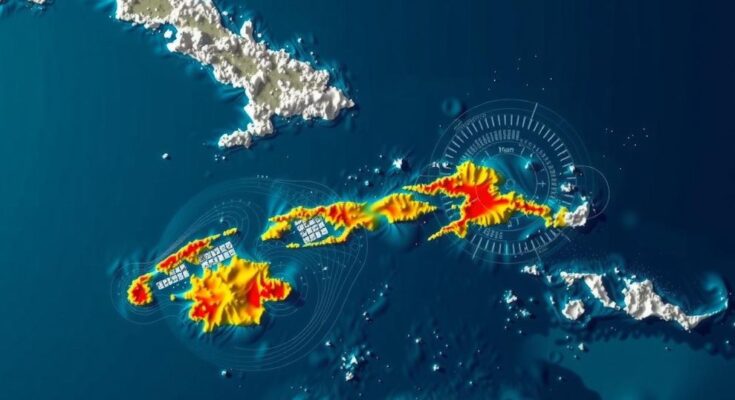Multiple earthquakes, including a 6.8 magnitude quake, struck off the south coast of Cuba near Pilon, affecting many in eastern cities like Santiago de Cuba. The tremors come as the region faces the aftermath of recent hurricanes and an energy crisis, raising concerns among the populace. Fortunately, no damage or injuries have been reported so far.
On Sunday, eastern Cuba experienced a significant earthquake measuring 6.8 on the Richter scale, accompanied by additional tremors registering at 5.9 and 4.6 magnitudes. The United States Geological Survey (USGS) reported that the epicenter was located approximately 25 miles south of Bartolomé Masó. This seismic activity occurred in the aftermath of severe hurricanes and widespread blackouts that have left residents on the island in distress. Across the eastern region, including the larger city of Santiago de Cuba, the tremors were felt considerably. Santiago resident Yolanda Tabío, 76, reported seeing walls shake and described how frightened people took to the streets. Despite the unsettling experience, she indicated that there were, as yet, no reports of damage or injuries from her community. In addition to the earthquakes in Cuba, several smaller quakes—ranging from 2.5 to 3.8 in magnitude—occurred near Puerto Rico within a span of 24 hours. Miami residents also reported sensations of tremors, leading the city’s officials to calm concerns by affirming that the USGS detected no seismic effects in South Florida. Meanwhile, the Cuban populace is coping with the fallout from Hurricane Rafael, which recently devastated western Cuba with destructive winds, power outages, and significant evacuations. Additionally, the island has been grappling with an energy crisis, leading to extended blackouts that have intensified public discontent and prompted minor protests. The cumulative impact of these natural disasters has left many Cubans feeling vulnerable and frustrated as they navigate ongoing challenges in daily life.
The recent seismic activity off the south coast of Cuba near Pilon followed an already traumatic period for the island, marked by hurricanes and extensive power outages. The situation has been exacerbated by the energy crisis, which has led to widespread frustration among residents. This context highlights the significance of the earthquakes, reflecting not only geological instability but also the socio-economic vulnerability of the Cuban population in the face of natural disasters. This cycle of adverse events has contributed to a growing sentiment of unrest and despair among the citizens, highlighting their precarious living conditions.
The earthquakes that struck eastern Cuba this past Sunday are a continuation of a challenging period for the island, already reeling from the impacts of hurricanes and blackouts. Despite the lack of immediate damage reports, the psychological effects on residents are evident, stirring fears amidst ongoing crises. As the nation grapples with the consequences of natural disasters and an energy crisis, community resilience and governmental response will be crucial in navigating this challenging landscape.
Original Source: www.cbsnews.com




